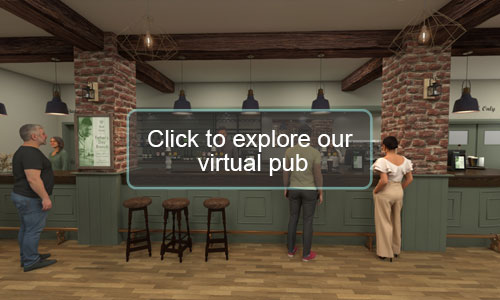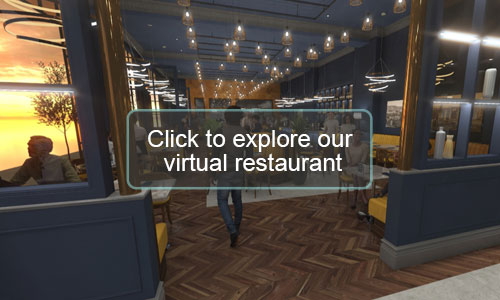See our connected technology in action
It can be hard to visualise all the different ways connected technology can improve both operations and guest experiences, so we thought we’d show you instead. Click below to explore our connected solutions through the eyes of your customers in our virtual pub, restaurant and hotel, and discover the benefits of integrated hospitality technology at every stage of the customer journey.
Subscribe to get the latest news, product announcements and industry updates
Serving Success: 10 Ways to reduce admin time using Zonal technology
No one gets into the hospitality business to fill out spreadsheets, but admin is a vital part of running any successful business. And, with staff in short supply and rising costs making every minute more precious than ever, finding ways to reduce time spent on admin has even more benefits.
Zonal technology can help automate admin tasks, which increases overall efficiency, reduces human error, and saves operators, and their teams, valuable time – and here are 10 ways how…
1. Export sales and revenue figures from your EPoS directly into your accounting system
Manually inputting sales figures from an EPoS into a separate accounting system is a laborious task. With Zonal’s smart, integrated EPoS solution, you can import this data directly into your accounting software, eliminating the need for a staff member to manually complete this task. Not only does this save valuable hours that could be better spent elsewhere, but it reduces the risk of human error too.
2. Keep track of employee start/finish times
Zonal’s technology can remove the headache of keeping on top of employee start and finish times by tracking exactly when your staff clock in and out directly in the POS. This means no more managing multiple timesheets and reconciling against rotas. Plus, staff hours can be easily accessed from one central location for easy reporting.
3. Manage stock ordering from one central platform
Maintaining stock counts and ordering new stock is a major time commitment for operators. However, having a digital stock management system provides tighter controls, as the entire ordering process can be managed end-to-end from one system and real-time reports mean operators can react quickly to low or surplus stock levels. This eliminates time spent checking discrepancies between systems, speeds up the whole ordering process with managed supplier lists and order templates, and results in less wastage and less cash tied up in stock.
4. Gain access to a comprehensive reporting suite to monitor business performance and metrics
Analysing your business’s performance is vital to maintaining a successful operation but collecting and collating all that data can be time-consuming. Operators that have a fully integrated suite of tech with powerful analytics and a digestible reporting solution can go a long way to making business evaluation a much simpler task. Zonal’s technology has the ability to generate reports on different areas of the business and automatically send these out to key members of staff. Not only can this be done quickly, but the real-time reporting means better and faster decision making, and seamless integration between our entire ecosystem of tech provides 100% data accuracy, meaning you’ll always be working with one version of the truth.
5. Auto-reconcile matching orders and invoices
A powerful stock ordering system like the one included as standard in Zonal’s EPoS, will automatically reconcile matching orders and invoices, helping to cut down time spent on manual checks each week, reducing mistakes and freeing up staff from what would previously have been a time-consuming task. This leaves everyone on the team with more time to focus on delivering great experiences for customers.
In addition, having the right tech in place can simplify managing approved suppliers. Being able to automatically reconcile matching orders and invoices or set up order templates can help to save a significant amount of time each week.
6. Get direct control over digital ordering channels to limit or increase your capacity
With a fully integrated tech stack, you have full control over which channels send orders through to the kitchen from one central location. Technology such as Zonal’s enables operators to turn off online ordering during busy periods to allow your staff to keep up with order fulfilment and focus on providing great customer service to those in-venue. This means less stress on the kitchen team and fewer customer complaints. What’s more, with full integration between our digital ordering channels and EPoS, product availability will automatically be updated as sales are made and stock is depleted, meaning your staff won’t need to spend time updating multiple channels if items go out of stock.
7. Remove the need for staff to re-key orders
Integrated hospitality technology like Zonal’s can help speed up service and save staff time. Integrating ordering and payment channels across the business with the main EPoS means staff don’t need to repeat the same task for each ordering channel. In addition, pushing live product availability from your stock management system to your tills and staff handheld ordering devices, means the team will have up-to-the-minute information on stock availability. This results in no wasted time going to the EPoS with orders only to then find out certain menu items are not available and fewer complaints from customers who tell us that one of their biggest bugbears in hospitality is ordering a dish, only to then find out it isn’t available.
8. Remove the headache of finance auditing (and save money) with clear and concise cash and finance workflows
Finance auditing can be time consuming and laborious, however our tech provides complete oversight of how cash is moving through your business. From being able to define by venue whether floats are being used, allowing you to allocate a value and track it through trade; to approval workflows, allowing senior staff to check all expenses are valid and approved, Zonal technology can provide you with the control and oversight you need to effectively manage your business’s finances.
9. Facilitate bookings easily with EPoS-integrated booking and deposit ledger management
Access all the information you need to manage reservations or orders from other channels in one central location, removing the need for staff to check multiple systems and reducing the potential for mistakes. When it comes to bookings, operators can better manage staff rotas with real-time oversight of reservations. A digital booking system also enables customers to edit, manage or cancel their bookings easily, removing the need for staff to update information manually and reducing the chances of no-shows. We know that no-shows are costly for the industry – £17.59bn a year, in fact, with figures having doubled between September 2022 and September 2023.
10. Manage products and pricing from one central location
Keeping on top on products and pricing is a key factor for maintaining a successful business especially when margins are tight, but it’s a task that can be time-consuming, and costly if not done properly. Implementing Zonal’s integrated set of tech solutions allows operators to manage and update product and price information in one central location. What’s more, native integration between Zonal’s EPoS and wider suite of technology means all systems are updated in real-time, including across all consumer-facing channels, which saves operators and their teams time from having to replicate this task across multiple systems.
Technology should do the heavy lifting for staff and operators, freeing up their time to focus on delivering great customer experiences, and providing operators with the tools as well as the headspace to think strategically about how to further improve businesses.
Click here to take a quick 5-minute self-assessment to see how your current tech stacks up in the above areas!
Related resources
tools
Assessment 1: Reducing administration tasks
blog
Serving Success: 10 Ways you can maximise your margins with Zonal's tech
The Zonal Difference
Discover why Zonal is the best hospitality technology provider for businesses of all sizes
Transform your guest experience with in-depth customer insights
Streamline operations with one connected technology ecosystem
Stay trading from open till close with always-on trusted customer support
Subscribe to get the latest news, product announcements and industry updates
Post-Christmas stock GPs low? Improve margins by doing these 10 things
With the madness of Christmas and New Year a distant memory, more time and attention can be given to minimising the impact of the cost-of-living crisis in the year ahead.
In a visit to one of our customers recently, we helped them to carry out eight easy actions that, once implemented, saw GPs start to increase almost immediately – improving their bottom line and making a huge difference to their financial reporting.
By having full visibility of your inventory, you can maximise profit margins, which in turn will help you to make better decisions around purchasing, sales and marketing, enabling you to sell more products and reduce the need to mark down old, unsold stock.
So why not take the opportunity in a quiet moment to focus on getting your stocks in order by completing this checklist:
- Ensure all purchasing and cost prices are correct and ensure all delivery notes are accepted in your EPoS
- Ensure that all old, obsolete products are not being displayed on your EPoS system
- If your POS allows you to set up suppliers behind your products, ensure the correct supplier is enabled as default to ensure you’re ordering stock from the correct place
- If your EPoS system uses recipes, make sure your recipes are correct and up to date with the latest ingredients from the right suppliers
- Double check that all Promotions and Discounts were set up correctly for the Christmas Period – and start thinking about upcoming events for the year
- Triple check that all figures are correct before accepting any new stock orders
- Get into the habit of reporting on your stock every 7 days, in order to keep a firm eye on your weekly usage of stock and make sure you’re spotting any potential issues/mistakes as quickly as possible
- You may benefit from additional stock training to ensure that your team are following the correct stock procedure – Get in touch with your provider to find out what training they have available to upskill your team
If you’re using a purchase-to-pay solution that’s fully integrated with your EPoS:
- Ensure all deliveries have been reconciled and accepted in your purchase-to-pay solution
- Check all products and prices are correct in your purchase-to-pay solution
Please get in touch to learn more about how Zonal technology can help operators manage costs.
Related resources
tools
Hospitality Tech Assessment: Reducing admin tasks
webinar
The future of bookings & how to drive sales
Subscribe to get the latest news, product announcements and industry updates
Assessment 4:
Maximising margins

Zonal’s Maximising Margins self-assessment
Answer a few short questions to identify whether your tech helps you squeeze every percentage of profit from your operations. At the end you’ll get personalised guidance to help you maximise your margins.
Take our other self-assessments to see if you score just as well across other key areas.
Assessment 1:
Reducing administration tasks

Zonal’s Reducing Administration Tasks self-assessment
Answer a few short questions to identify whether your hospitality tech helps you combat any admin time-sinks or manual tasks that could be automated. At the end you’ll get personalised guidance to help you maximise your staffing resources and remove the manual grind.
Take our other self-assessments to see if you score just as well across other key areas.
The Pioneering Pub People Podcast 2023

Join us for another series of podcasts exploring every aspect of running a pub to help you grow your business and, ultimately, boost the bottom line, featuring some of 2023’s best pub operators! Fill your ears with advice, tips and ideas from some of the best pub operators in the business with this podcast series for publicans from Zonal and the British Institute of Innkeeping.
Missed our 2022 series? Dive into the entire podcast series now!
Episode 6 - Joe Buckley and Flo Pearce, The Tollemache Arms
In the first episode of our Pioneering Pub People 2023 podcast series in partnership with the BII, we sit down with this year’s BII Licensee of the Year champions – Joe and Flo from The Tollemache Arms – to talk about all things Tolly. From Tolly Fest and running effective pub marketing campaigns, to sharing their experience entering the BII Licensee of the Year Award for a second year running, discover what makes The Tolly the hub of the local community.
Episode 7 - Michelle Gilmour, The Old Windmill
In the second episode of our Pioneering Pub People 2023 podcast series in partnership with the BII, Molly is joined by 2023 Licensee of the Year Award finalist Michelle Gilmour of The Old Windmill in Coventry to talk about how she got started in the industry, what keeps people coming back to The Old Windmill, her approach to managing staff, and the challenge of keeping hungry customers in-venue whilst still remaining a wet-led pub.
Episode 8 - Ollie Coulombeau, The Turk's Head
In this episode of the Pioneering Pub People Podcast, Molly is joined by Licensee of the Year Award 2023 finalist Ollie Coulombeau of The Turk’s Head in Twickenham to talk through what makes his pub such a success! From the differences in managing different customer-bases between locals and visitors for Twickenham Rugby, to his career in hospitality, developing his team and what’s in store for the coming years!
Episode 9 - Keris De Villiers, The Pig & Whistle
In this episode of the Pioneering Pub People Podcast, we’re joined by Licensee of the Year Award 2023 Finalist Keris De Villiers to explore what makes her pubs so great – from sustainability, to putting together, managing and developing a great team, and sponsoring local sports teams!
Zonal has a wide range of technology solutions designed to make life easier and businesses more profitable. Find out more about our range designed specifically with pub tenants and licensees in mind, here!
Subscribe to get the latest news, product announcements and industry updates
Subscribe to get the latest news, product announcements and industry updates
Ask the Expert - How can hospitality technology help reduce costs and manage waste?
With managing and reducing costs front-of-mind for every hospitality operator right now, it’s important to understand the role technology can play, however finding the right tech and knowing what functionality to look out for amongst a sea of different suppliers and solutions can feel like a daunting task.
To help you navigate the world of hospitality tech and identify which solutions you should consider implementing in your business, we sat down with Joel Wilson, Technical Sales Manager at Zonal, to explore how technology can help businesses more effectively manage costs through greater control of their purchasing, improved stock accuracy and greater stock visibility.
- How can technology reduce wastage and costs?
Tech’s main role in this area is to help provide visibility. By providing visibility we can help increase accuracy, and having those two things in place will naturally start to reduce waste and costs.
With products in particular, having a procurement or purchase-to-pay platform in-place can really help, by giving full visibility of your cost prices, all the way from the point of ordering to the point of receipt of the goods, to the point of invoicing. Sometimes the cost price we see when we order something and the cost price we’re invoiced for can be two different things, so having the visibility and auditability of that is really important. What’s more, if there’s a difference between the cost price that you’ve ordered and the cost price that you’ve been invoiced for, having a system that flags these so you only need to look at particular invoices, means you can spend less time on the auditing process and more time on the credit resolution stage.
Another area it can help is with digital count sheets, so if we think about the stock audit process, the really annoying and time consuming bit once you’ve done the count is then having to add all of that up, add your count up and then manually enter it in. If you have digital count sheets that let you just automate that process, and import all of those figures in, you then get to spend more time on the important bit which is the analysis side of things – pinpointing where those variances are and why those variances might’ve happened.
- How can tech help operators more accurately manage their stock?
An integrated stock system needs to be able to provide real-time visibility of stock holding and then have the ability to manage, maintain and communicate that. One of the key ways of being able to do this is through line checks. They provide a granular view of your stock, and of your stock variances, so you can start to be able to pinpoint where these are occurring and be able to respond immediately to any issues – you’re not having to wait until the end of the week or the end of the month to find out what your stock result is, you can get a real-time view there-and-then and respond.
Having that data in real-time doesn’t restrict your operations either, so you can build it naturally into your working day. If you’re having to wait for data to process overnight you might then only have a set window to do these analysis tasks, but the fact you can do this as and when you need to is really important.
- Are there other tech solutions that operators should look at if they’re trying to cut wastage and costs?
Other solutions operators could look at include recipe modelling, or menu management tools – systems that help you to model your menu items and dishes and provide full visibility over your GPs and your margins, with a full cost-breakdown , including each individual ingredient. So sometimes we know what the overall GP of a dish is, but we don’t necessarily know the makeup of that – but once you know the impact of each ingredient to a dish, you could tweak those to see if there are any potential savings that can be made.
Another key benefit of these tools is the standardisation of your operations. We can spend a lot of time modelling our costs and our dishes, and from a theoretical point of view we know what to expect GP-wise, but sometimes that isn’t delivered at a site level. Building in things such as specification cards, methodology statements and dish photos, gives us the knowledge that when this is passed on to the sites – they not only know what to buy and where from, but they also know how to produce the dishes and ensure things are being executed properly and consistently.
Development menus and temporary stock items can also be built in these tools so, when faced with supply chain issues, you know that if you’re having issues with a current supplier or particular product line, you can start to do the work in the background to help mitigate the impact on your business. Then, once a switch is needed, you can make the ingredients in your dishes live so the switch is seamless.
If you’d like to find out more about how Zonal’s solutions can help you better manage costs and minimise wastage in your business, get in touch today for a technology consultation and one of our experts will be happy to talk you through what’s possible!
Subscribe to get the latest news, product announcements and industry updates
5 ways inventory and ordering systems can help hospitality businesses reduce costs
Being able to effectively manage suppliers, product availability and menus down to an ingredient level will ensure operators are able to tackle rising costs and remain profitable – all while maintaining the same standard of service guests expect.
Implementing smart back-of-house tech solutions which update in real-time and that are fully connected to other tech in the venue, such as the EPoS, will enable operators to make vital cost-cutting decisions based on accurate data from across the entire business. Technology can also streamline and speed up mundane, labour intensive or time-consuming tasks involved with managing inventory and ordering, as well as reduce waste.
For many operators, manually managing inventories and stock is a particularly time-consuming task, and one that can cause a huge admin headache if not done accurately. But it can also be costly to operators in terms of their bottom line and wastage, so utilising robust, feature-rich technology to aid the process will undoubtedly prove to be beneficial.
With this in mind, here are five ways that digital stock and order systems can help operators transform their inventory management:
-
Make real-time decisions by integrating your EPoS and stock solutions
We all know that having accurate and up to date stock information is a critical part of the business decision making process. As hospitality businesses have increased in operational complexity, so too has the process of calculating the stock. There is a real danger that in modern operations decisions are being made based on inaccurate information generated by conflicting stock management processes.
First and foremost, EPoS integration would be beneficial. At Zonal, our EPoS comes as standard with a complete stock management solution, which provides accurate, real-time data that allows businesses to ensure appropriate amount of stock for each product is being held, enabling operators to set limits on product usage, mark them as ‘unavailable’, as well as run regular line and spot checks and same day stock takes. The system also enables operators to review stock position down to an individual ingredient. This enables operators to avoid the potential for unnecessary overordering and reduces the amount of cash tied up in stock. The real-time data provided by the system also enables operators to keep on top of where and for what reasons they are losing money, whether that be due to drinks being poured in error or staff giving away too many free drinks.
Ensuring sales data is being captured from the till and other ordering channels – and that all this insight is feeding into the stock management system – will enable operators to keep tabs on stock, purchasing and costs, all in real-time, meaning they can be quick and agile in making important cost-cutting decisions. Not only this but having the right solutions in place allows operators to reduce admin time and ensure accuracy of purchase items and recipes by removing the need to re-key the information.
-
Use order templates to improve the purchasing process and minimise errors
Preparing a stock order is often viewed as a necessary evil. Even with a flawlessly organised stock room, team members can find themselves spending a large amount of time trying to obtain an accurate account of stock needed. Not only that, but this runs the risk of missing key products, or juggling new product lines during a menu change. The outcome of this is inaccurate product levels and availability.
Having feature-rich purchasing and stock control systems that allow staff to create order templates for items that are ordered regularly can be particularly useful to operators. This enables them to re-order popular products quickly, reduces errors being made with the ordering of stock, as well as minimises the risk of over-ordering. Templates can be set up either by an individual operator on-site or at head office level, and pushed out across a whole estate, helping to streamline the ordering process regardless of the size of the operation.
With a few simple clicks of a button, staff can create templates directly in the system – either from scratch or based on previous orders that need to be replicated regularly. What’s more, the list of products to order within the template can be ordered based on the layout of the back bar or storeroom, making it easier to cross-check physical stock in-venue against the ‘regular order’ template, helping to speed up the process and further reduce the potential for unnecessary over-ordering. These templates can then be re-ordered however regularly they need to be, so you can ensure the right amount of stock is always available.
What’s more, with the right system, value-based approvals can be set up as part of the ordering process if needed by a business. This is particularly useful for pubs, bars and restaurants with multiple sites, as orders that exceed a configurable threshold cannot be made until approved by a manager, helping to eliminate unnecessary costs caused by purchasing errors before they occur.
-
Use suggested ordering functionality to save time and manage stock levels more effectively
We know that operators are continuously looking to reduce the time spent on repetitive tasks, whilst also maintaining a high degree of accuracy. Whilst having tools to help build a stock order are helpful and do save time, it often remains a laborious task and can certainly be a challenge for inexperienced team members. Suggested ordering is one way to drive a reduction in admin time and to increase stock order accuracy – keeping stock holding values down whilst also ensuring all items remain available. An effective suggested order facility will consider real-time stock holding levels (driven by EPoS integration), minimum stock and par levels and anticipated usage taken from historical usage.
This kind of facility ensures businesses are not needlessly ordering too much stock, driving high stock holding, increased wastage and added burden to operations. It also provides a safety net to prevent underordering which impacts product availability and ultimately revenue.
-
Manage suppliers and costs effectively, to help boost profits and protect margins
Having stock in place at the right levels and at the right time is certainly a key element for keeping costs down. But so too is having the right stock from the right source and at the right price. Keeping track of suppliers, catalogues and prices is important to ensuring cost of sales is where it needs to be, however this is becoming an increasingly challenging task to manage.
Back-of-house tech can play a crucial part in this process. It offers operators tools to digitally store large product lists, segment products into manageable catalogues and importantly import prices changes as they happen. These digital processes make managing suppliers simple and ensure teams are always ordering the right products to hit those all-important margins. And with supply chains facing ever increasing challenges, the reduction in admin overhead is a welcome relief for those responsible.
Having a fully digital supplier and ordering process also allows operators to drastically reduce the time and effort needed in processing both invoices and credit notes. The use of ‘invoice matching’ technology eliminates the need to manually reconcile delivery notes and invoices where they both match – leaving only those that have discrepancies. And where discrepancies occur, having a fully digital credit request and acceptance process allows for tighter control and reduces the risk of losing money.
Not only does all this save staff admin time, but it enables operators to also protect and even boost margins.
-
Use data and reporting to drive business decisions and cut costs
Technology doesn’t only provide direct operational improvements to your inventory management – it also provides access to a whole host of reporting you can use to make smarter decisions to cut costs, such as helping you quickly identify any potential issues when it comes to stock.
Being able to see a report – in a few clicks of a button – that estimates how may days’ stock you have on hand based on live data makes managing stock levels easier and reduces the risk of waste and overordering too. Zonal’s end-to-end purchasing system, Acquire, also displays discrepancy reports which can help operators or staff easily identify where errors are occurring throughout the ordering process, such as incorrect invoices. This empowers operators to better manage their supplier relationships and cut down on time spent dealing with these issues.
The thing that makes this all possible however, is having an EPoS that is integrated with all the back-of-house and stock-taking tech. Having integrated systems which use the EPoS as the central data hub allows for seamless data sharing and reporting, providing you with one version of the truth for accurate, insightful reporting. This enables operators to be able to very quickly identify where processes across the business can be improved and made more efficient, such as identifying the need for more training for staff or recipes that may need refining to maximise margins, helping to save businesses time as well as money.
Using the right technology to manage both suppliers and stock can help operators manage the level of waste they produce which in turn can save them valuable money, and allowing technology to do the heavy lifting will let you know where those all-important pennies can be saved across the business.
Discover how you could reduce costs in your business with Zonal’s integrated technology
If you’d like to find out more about how our hospitality EPoS and inventory & ordering systems could help you to more effectively manage costs in your business, get in touch today and our team of hospitality technology experts would be happy to show you what’s possible!
Subscribe to get the latest news, product announcements and industry updates
Four ways F&B tech can help Holiday Parks prepare for a rise in cost-conscious holidaymakers
Amidst the current cost-of-living crisis, holidaymakers are expected to look closer to home this year, when planning a getaway. In fact, recent research suggests that 90% of travellers will plan a domestic trip in the next 12 months, with some planning shorter breaks to help keep costs down.
With activities such as caravanning, camping and glamping all popular staycation choices for holidaymakers, how can Holiday Park operators better utilise tech in the F&B arm of their business to capitalise on the opportunities the staycation boom brings, whilst also ensuring they are safeguarding their businesses for the future? Here’s just some of the ways that tech can help.
1. Pinpoint peaks
Despite economic uncertainty, recent data suggests that holiday retail spending will rise this year, and with more and more guests deciding to spend their holidays in UK holiday parks, operators that plan ahead and iterate on previous years’ successes can expect to see results. Technology can play a key role in helping you to achieve this, particularly in your F&B offering. With a fully integrated suite of technology in a park’s restaurants, bars, pubs and cafes, it’s easy to identify what worked well the year before during peak times – from what products sold best in the on-site bar, to what discounts customers took advantage of in the restaurant – providing detailed insights into what your customers respond well to in your hospitality facilities, and helping you to identify opportunities to increase spend. It’s also just as important to identify what didn’t work to ensure you’re offering products your guests want to buy, and that you’re not over-stocking on products that won’t sell well.
However, it’s not just your peak times that you should be looking at – data collected during quieter trading periods can also yield some really useful insights. This data will provide you a complete picture of how your business has been performing, during both the peaks and the troughs, to enable smarter, data-led decision making – such as ensuring you always have your most popular food and drink in stock at the right times, or planning more effective promotions to drive more revenue during the less busy trading periods.
2. Look at your environmental agenda
Consumers are becoming more eco-conscious and as result, expect the businesses they buy from to be more socially responsible too. However, when you’re faced with an increase in visitors and a busy park, how can you ensure you keep on top of demand while also prioritising your environmental responsibilities, such as reducing waste? By investing in an effective digital stocktaking solution for your F&B facilities that allows you to look at what’s not being ordered, what’s being wasted in the kitchen and what’s coming back on the plate, you can monitor portion sizes and reduce over-ordering of ingredients. Keeping on top of waste not only helps the bottom line but also helps to achieve sustainability ambitions, as well as ensuring you’re able to keep the value of your offering as reasonable as possible for guests in a year where costs will be front-of-mind when deciding where to spend their holidays.
3. Real-time, seamless data sharing
It’s no secret that data is at the beating heart of any hospitality operation, with holiday parks being no exception, bringing operations together and providing all the tools you need to manage your business successfully and efficiently. It connects the dots between your front and back-of-house, as well as helping you to easily generate an overall picture of your business, delivering you complete operational control – so it’s important that it’s being analysed and used correctly. For example, back-of-house tech that is integrated with EPoS can identify when the kitchen is too busy with in-venue diners and cut off takeaway or click & collect orders automatically, ensuring your in-venue customer experience isn’t affected. This real-time data can also have tangible benefits for your customers during the order journey itself. Fully integrated technology will push live stock availability to all your ordering channels whether it’s a till, handheld ordering device, or online ordering channels, meaning both your staff and customers will always know what’s available to order and what’s out of stock, eliminating a major bugbear for customers before it’s even occurred. A win for both you and your visitors!
4. Reward and incentivise returning customers through loyalty schemes
A tech-enhanced experience is crucial in achieving a loyal cohort of guests, as it helps in encouraging customers to return to your holiday park. Our research has shown that fewer than one in five (18%) of holiday park guests are currently signed up to a loyalty initiative, but of those who aren’t, nearly half (45%) say they would be interested in signing up to a scheme. With the cost-of-living crisis still impacting overseas travel, here is your opportunity to reap long-term benefits, starting with a loyalty scheme. Investing in an integrated digital loyalty solution will help gain valuable insights that can be gained from harvesting guest data. Visit frequency, guest preferences and spend can all be collected, so you can send tailored deals and rewards to each customer, driving more engagement and sales and increasing the value of your offering to your cost-conscious guests, something that’s sure to keep them coming back year on year.
Zonal has a wide range of technology solutions designed to increase efficiency and help holiday parks become more profitable. Find out more here!












